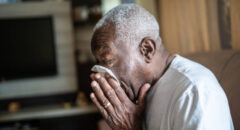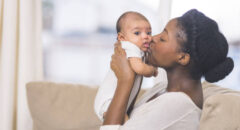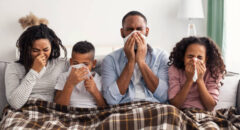
The common cold-like virus known as respiratory syncytial virus (RSV) may cause a cough in certain people. Though it usually goes away within a few weeks, it’s something to watch for in kids, older people, and those with breathing issues. Medication, humidifiers, and other treatments are available.
Annually, RSV causes 58,000 to 80,000 hospitalizations in children under the age of five and 60,000 to 160,000 hospitalizations in people 65 and up in the US, according to the CDC.
Although RSV is widespread and sometimes mimics the common cold, physicians warn that it may be especially dangerous for small children and the elderly. A cough, the intensity of which might vary, is a common symptom of RSV. It may be possible to let this cough go away on its own if you or a loved one suffer from it, but medical attention may be necessary if it becomes a breathing problem.
RELATED: Types of Coughs and What They Mean
What Is An RSV Cough Like?
Mucus may make an RSV cough sound watery. People who have severe illnesses typically have a cough that sounds like wheezing or difficulty breathing.
The ability of medical professionals to diagnose RSV from a patient’s cough was the focus of one study conducted in 2020. According to their findings, medical professionals needed 3.5 years of expertise before reliably identifying RSV from a cough alone. Also, a nasal swab sample remained the most reliable way to diagnose RSV, even though nurses and senior staff could do so with 76.2 percent and 73.1 percent confidence levels, respectively.
When To Get Emergency Care
For immediate medical assistance, dial 911 or visit an emergency room if you or your child are experiencing difficulty breathing, dehydration, or worsening symptoms.
Talk to your child’s doctor if you notice anything else:
- The condition has not resolved after a week.
- When a child’s rectal temperature rises to 100.4°F (38°C) or above, it is considered a fever. Similarly, a fever that consistently rises beyond 104°F (40°C) is regarded as a fever in children older than 12 weeks.
- Onset of symptoms such as chest discomfort or an ear infection
How Long Does An RSV Cough Last?
Symptoms of RSV normally peak between days three and five, lasting for around five to seven days overall. However, a moderate cough may persist for a few weeks after this.
RELATED: Why Your Cough Isn’t Going Away (And How To Stop It)
How Serious Is An RSV Cough?
Coughs caused by RSV might vary in severity. When other symptoms go away, it’s normal for a moderate cough to








